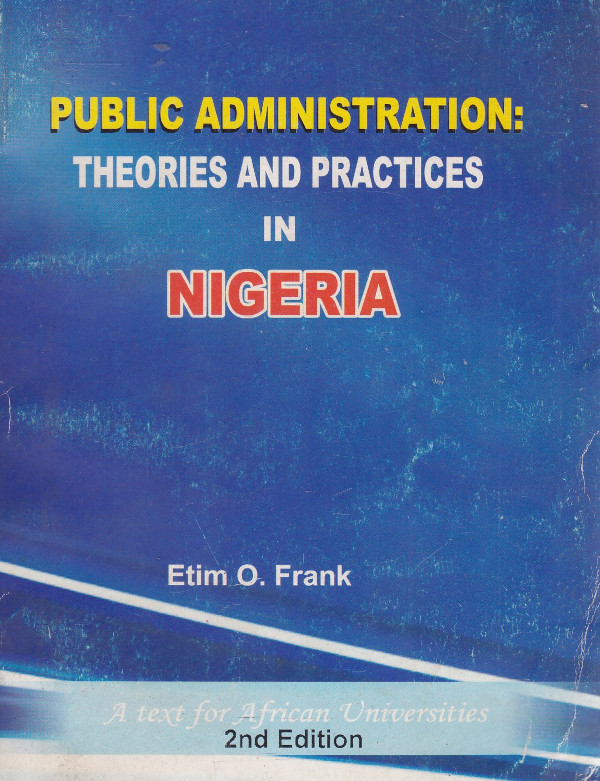Public Administration: Theories and Practices in Nigeria (2nd Edition)
$10.00
CONTENTS
CHAPTER 1: INTRODUCTION TO PUBLIC ADMINISTRATION
Introduction l,
Public Administration: A Process 2,
Conceptions of Public Administration 4,0
Public Administration in Nigeria 5,
Schematic Representation 8,
Public Policy 10,
Essence of Adniinistrative Theories ll,
Social Organization 12,
Typologies of Organizations l4,
Functions of Public
Administration l6, Modern Functions 18,
Praxis of
Administration 24, Administrative Culture 25
CHAPTER 2: THEORIES OF ADMINISTRATION
Nature and Scope 27,
Bureaucracy 28,
Organizational theory 33,
Administrative theory 35,
Classical-Scientific theory 37,
Neo-classical theory 39,
The Management school 40,
Decision-Making 40,
Rational Comprehensive theory 41,
Disjointed Incrementalism 41,
Public Choice Model 42,
Theory , Motivation theory 46,
Public Administration: Africa
Pre-Colomal 50,
Benin-Kingdom 53,
Traditional Bureaucracy of the Oro People 56.
CHAPTER 3: PUBLIC ENTERPRISES IN NIGERIA
Rational for Public Enterprises 65,
Types of Management Boards 71,
Problems of Public Enterprises 72.
CHAPTER 4: HUMAN RESOURCES MANAGEMENT: PUBLIC ENTERPRISES
Personnel Selection 76,
Structural Problems 77,
Manpower Planning 78,
Manpower Planning and Public Service 80,
Problems of Manpower Planning: Nigeria 81.
CHAPTER 5: LOCAL GOVERNMENT ADMINISTRATION
Meaning of Local Government 83,
Local Administration:Rational 84,
Theory of Counsellorship 86,
Urban Administration 87,
Problems of local Government 88.
CHAPTER 6: ADMINISTRATIVE EVALUATION: SOCIAL INDICATORS
Social Indicators 93,
Social Impact Evaluation 93,
Baseline Data 98,
Utility of Social Indicators, 98,
Administrative Evaluation Resistance 100,
Types of Social Indicators 101.
CHAPTER 7: COMPARATIVE PUBLIC ADMINISTRATION
Comparative Studies 104,
Conceptions 106,
Growth of Comparative Studies 106,
Contending Issues in comparative Public Administration 108,
Resolution 109.
CHAPTER 8: PEDAGOGY OF PUBLIC ADMINISTRATION
Interdisciplinaiy Nature 110,
Pedagogy of Public Administration: Structures 112,
CHAPTER 9: TRAINING AND PARKINSON’S LAW
Training 115,
Fonns of Training 118,
Parkinson’s Law 120, and
Parkinson’s Law: Nigeria 121,
Work-Study 122,
Parkinson’s Law and the Problems of Civil Service 123,
Fundamental of Training 124.
CHAPTER 10: PUBLIC FINANCE AND BUDGET
Concept of Public Finance 126,
Sources of Finance 126,
Budget 127,
Components of a Budget 128,
Reasons for Studying Budget 130,
Theories of Budgeting 131,
Budget Preparation 133,
FiscalPolicy 135
PART 2
CHAPTER 11: PROCESSES OF PUBLIC ADMINISTRATION
Government 137,
The Public-in Public Administration 138
Functions of Government 139,
Processes of Administration?
federal/Unitary/Confederal 140,
Organization 143,
Ministries-Depaitinents andAgencies (MDAs) 144.
CHAPTER 12: CONDUCT OF GOVERNMENT BUSINESS: THE CIVIL SERVICE
The Civil Service: Raison D’etre 147,
Civil Servant and Policy Formulation 148, Techniques of Policy Implementation 149,
Civil Service and Continuity in Goveniment 150, Personnel
Practices
CHAPTER 13: PERSONNEL CATEGORIES IN THE CIVIL SERVICE
Personnel Analysis in the civil service 155, Administrative Class 156,
Executive and Technical Class 157,
Technical Cadres 158.
CHAPTER 14: REFORMS AND REVIEWS IN THE CIVIL SERVICE
The need for Reforms 159,
Outcomes of Reforms 161,
Personnel Management in Nigeria 162, Challenges of Personnel Management in Nigeria 163,
Human Resource Planning 166,
Human resource and Personnel Management Job 168,
Methods of Job Evaluation 170,
Animal Performance Appraisal 173,
Wage Administration 177,
Workmen Compensation Act 180,
Employment Interview 183,
Employment 187.
CHAPTER 15: EFFICIENCY AND EFFECTIVENESS OF THE CIVIL SERVICE
Description of Efficiency and effectiveness 189, Causal factors of Inef?ciency and lneFfectiveness 193,
Upgrading Servlce effectiveness 195,
The Civil Service and National Development
196,
Productivity and Accountability 200,
Public Administration Mind guide 201
References
Index
Description
PREFACE
The book was written to ?ll the theoretical lacuna, which existed then in the ?eld of ‘Public Sector Management’ aka ‘Public Administration’. It was further meant to espouse the theoretical Foundations of all the facets of Public Sector Management, starting from the formation of the Government (Leviathan), out of the state of nature, to the development of public policies, laws and executive orders from the executive arm of the government, to the Legislature, through public administration and specifically to the Ministries, Departments and Agencies (MDAs) for delivery to the larger society.
When that take place, the MDAs are bound to design the strategies forimplementing these inputs to them with the allocated resources. The ultimate intention of all public policies is to add value to the quality of life of men and women in the society.
The instrument of Public Sector Management therefore serves as a bridge between the state or Government and the larger society. This is what this book treated in fifteen (15) chapters, five more
chapters in this edition than the first edition.
The need to revise and enlarge the book arose from the development in the macro society and the compelling need to address the issues contained in the five (5) new chapters in this edition.
It is an uiiderstandmg of the theories, which would enhance the comprehension of the operations of the Public Sector Management at the superstructural level.
Bona-petite.
E. O. Frank
Clement lsong Centre for Development Studies
University of Uyo
Akwa Ibom State
2015

Dr. Etim Frank
Etim Okon Frank is an articulate scholar of Political Science and Public Administration who has added value to several institutions till he joined University of Uyo in 2008.
His ardent personality has made him a choice candidate for several responsibilities within and outside the University some of which includes Acting-Director Clement Isong Centre for Development Studies, Member, Akwa Ibom Advisory Committee(AIPAC) Niger Delta Dialogue, External Examiner, Department of Public Administration, University of Calabar etc.
He is a member of some high profile professional bodies like Nigerian Institute of Personnel Management, Chartered Institute of Public Diplomacy and Management etc.
His passion for Political and Administrative theories has given birth to several researches published as books, monographs, journal articles, book chapters and conference papers. Majority are open access on his virtual space at www.etimfrank.com.ng.
Questions and Answers
You are not logged in
